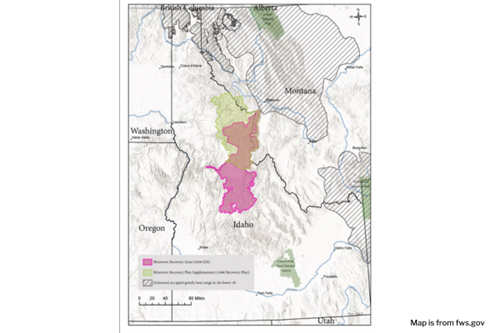Capitol Reflections: 2024 Session, Issue 2
By: Idaho Farm Bureau Governmental Affairs
“The liberties of our country, the freedoms of our civil Constitution are worth defending at all hazards; it is our duty to defend them against all attacks. We have received them as a fair inheritance from our worthy ancestors. They purchased them for us with toil and danger and expense of treasure and blood. It will bring a mark of everlasting infamy on the present generation – enlightened as it is – if we should suffer them to be wrested from us by violence without a struggle, or to be cheated out of them by the artifices of designing men. Of the latter we are in most danger at present: Let us therefore be aware of it. Let us contemplate our forefathers and posterity; and resolve to maintain the rights bequeath’d to us from the former, for the sake of the latter.” -Samuel Adams
2024 Water Convention
 There were many water/irrigation managers and representatives in town this week as part of the Idaho Water Users Association’s (IWUA) 87th Annual Convention. Farm Bureau was a proud sponsor of the IWUA event and was happy to see so many Farm Bureau members there in attendance.
There were many water/irrigation managers and representatives in town this week as part of the Idaho Water Users Association’s (IWUA) 87th Annual Convention. Farm Bureau was a proud sponsor of the IWUA event and was happy to see so many Farm Bureau members there in attendance.
A large variety of topics were discussed and considered at this year’s convention. Whether it was top water priorities for this year's legislative session, the latest state snowpack report, updates on regional and national issues including the proposed settlement agreement regarding the Lower Snake River Dams, or out of state perspectives on groundwater management; IWUA convention goers were able to learn about it all.
Attendees also had the chance to hear from newly appointed Idaho Department of Water Resources (IDWR) Director, Matt Weaver. Director Weaver’s appointment was just approved by the Senate Resources Committee this week and will be considered by the full Senate in the coming weeks. The Director outlined his vision for the Department, discussed adjustments in administrative positions, and addressed his perspective on several hot button issues from around the state. IFBF’s State Water Committee has scheduled to hear from Director Weaver at the IFBF Legislative and Commodity Conference on Feb. 6th in the afternoon. Farm Bureau members who would like to hear from the Director are welcome to attend the Water Committee meeting.
Of particular interest to Farm Bureau, was the conversations regarding legislative priorities. Farm Bureau is part of IWUA’s workgroups on the topics of Idaho’s Domestic Exemption law, and the Area of Common Groundwater Supply, both of which are working on draft legislation that may be considered during this legislative session. IFBF Policy listed below is guiding staff as conversations continue with these two topics.
- IFBF Policy #29 regarding domestic wells supports Idaho Water law first-in-time, first-in-right, being applied to all wells drilled in Idaho, including domestic wells. We support evaluating domestic wells under Idaho water law for new wells in the future which would require developers to supply irrigation water and/or irrigation water delivery systems using existing water rights and/or gray water to new developments. We support IDWR enforcing the domestic well exemption restrictions on one half acre homesteads, not to exceed 13,000 gallons of water used per day.
- IFBF Policy #30 regarding groundwater districts supports changing the boundaries of local groundwater districts that are directly connected to the underground aquifer to include those who are not currently participating but are of a common groundwater source.
IFBF supports updates to Idaho’s domestic exemption and areas of common groundwater supply policies that are consistent with the IFBF policies stated above. Farm Bureau will continue to work with our IWUA partners and the Idaho Legislature to update and improve the state’s water policies.
For those that are interested in the latest NRCS snowpack reports, visit this website: NRCS Idaho Snow Survey and Water Supply | Natural Resources Conservation Service (usda.gov)
For BOR storage reservoirs levels “teacup” diagrams, visit this website and select the region you are interested in: Hydromet Pacific Northwest Region | Bureau of Reclamation (usbr.gov)
Wildlife Data Tracking Bill
 Representative James Petzke (R-Meridian) introduced H404 in the House Resources and Conservation Committee limiting the ability for entities to access records showing where wildlife exists on public or private land. Currently, anybody can submit a Freedom of Information Act (FOIA) request and the state would be obligated to provide information showing exactly where wildlife animals are documented by means of GPS, collars, or game cameras. Wildlife advocacy groups utilize these tools to strategize methods that prevent hunting, such as chasing animals away and harassing producers. The legislation does allow for agencies to release information that would show broad areas of wildlife presence, but not precise locations.
Representative James Petzke (R-Meridian) introduced H404 in the House Resources and Conservation Committee limiting the ability for entities to access records showing where wildlife exists on public or private land. Currently, anybody can submit a Freedom of Information Act (FOIA) request and the state would be obligated to provide information showing exactly where wildlife animals are documented by means of GPS, collars, or game cameras. Wildlife advocacy groups utilize these tools to strategize methods that prevent hunting, such as chasing animals away and harassing producers. The legislation does allow for agencies to release information that would show broad areas of wildlife presence, but not precise locations.
AFBF Policy 567.6.1 supports this bill.
Historic Changes in JFAC
 Idaho has a unique process for determining how much to spend to fund state government functions. Unlike most other states where one chamber of the legislature writes state agency budget bills that then have to go over to the other chamber, and hope that they will agree, Idaho has a different system. Our state is one of the few that has a joint committee for budget writing purposes. JFAC, or the Joint Finance and Appropriations Committee, is made up of ten House members and ten Senators. They work jointly to come to consensus on state agency budgets, thus alleviating a lot of the wrangling back and forth that happens in other states between chambers.
Idaho has a unique process for determining how much to spend to fund state government functions. Unlike most other states where one chamber of the legislature writes state agency budget bills that then have to go over to the other chamber, and hope that they will agree, Idaho has a different system. Our state is one of the few that has a joint committee for budget writing purposes. JFAC, or the Joint Finance and Appropriations Committee, is made up of ten House members and ten Senators. They work jointly to come to consensus on state agency budgets, thus alleviating a lot of the wrangling back and forth that happens in other states between chambers.
Last year, the way votes are tabulated in JFAC was adjusted. Previously, all twenty members voted together, and a majority vote prevailed. Unfortunately, sometimes the members of one chamber were overwhelmingly supportive of a proposal, while only a small minority of the other chamber was supportive, but the measure still passed through the committee. This meant that despite the majority of one chamber’s members opposing the proposed budget, it still went to the floor of that chamber for approval. As you can guess, it did not always pass on the floor of that chamber, and that meant the entire process had to start all over again since it is required to have a budget for each department passed by both the House and Senate.
To avoid that situation, the votes are now tabulated by chamber in the committee. If all ten Senators approve the proposed budget, but only four House members, the proposal fails since it now takes a majority of members in each of the chambers on the committee to pass. This new method has been helpful in avoiding budget bill showdowns on the floor.
This year, an even bigger change has been implemented by JFAC co-chairs Rep Wendy Horman (R-Idaho Falls) and Senator Scott Grow (R-Eagle). Instead of following the past tradition of having presentations from every government agency telling JFAC all the great things they are doing, and how much additional money they need to keep doing those wonderful things, now budget analysts working for JFAC present the state government budget requests, item by item, and then the agency head is available to answer any questions the JFAC members may have for them.
This will lead to a LOT less advocating by agencies for ever increasing budgets and will help committee members drill down into the real needs of the agency to perform their statutorily required duties.
The other part of the change implemented this year is even more dramatic. In the past, all the agency presentations took at least six weeks to complete. Then, there was a period of about two weeks to set the budgets, and another couple of weeks to pass the individual budgets on the floor, unless there were problems, which would drag out the timing. The legislature could not adjourn until the budgets were completed, and so the legislative session had to be extended sometimes to deal with budgets that must be re-worked (usually cut back, but not always) following a defeat on the floor.
Under the new process, JFAC passes what they call “maintenance” budgets early in the session. A maintenance budget is essentially the same dollar amount that the agency used last year, with an inflation factor, just enough to maintain the agency at the current level. JFAC has already passed the maintenance budgets for this year, and they will soon receive a vote on the floor of each chamber.
Now, JFAC will begin to review the “add-ons” that each agency has asked for, and will determine if they are interested or willing to approve any of the additions. Those will come forward in separate bills later in this session. Then, if one chamber does not approve of the “add-ons,” instead of holding up adjourning the session, the maintenance budget was already passed, so the agency just won’t get the additional funding they were requesting.
Farm Bureau policy supports limiting growth of state personnel on the public payroll to the rate of population growth, and limiting the growth of state expenditures at or below the percentage of economic growth in the state. These significant changes in the state budgeting process will assist the legislature in moving towards the goals of these two policies. We applaud co-chairs Grow and Horman for their vision in recognizing the pitfalls and unintended consequences that were inherent in the previous JFAC processes.
FWS Considers Introducing Bears in the Bitterroot
 The U.S. Fish and Wildlife Service (FWS) announced their intention to prepare an environmental impact statement (EIS) to consider the implications of introducing bears into the Bitterroot Ecosystem, a geographical area in Idaho and Montana. In 2023, a District Court in Montana ruled FWS delayed introducing grizzly bears into the ecosystem and a new EIS was required to determine how introduction would impact surrounding areas. Grizzly bears have been documented in this area but insufficient numbers to meet recovery goals. IFBF Policy 68 states “We oppose the reintroduction of grizzly bears into any area of the State of Idaho”. We encourage members to join us in signing up for the public scoping meetings and submit comments in opposition of reintroduction.
The U.S. Fish and Wildlife Service (FWS) announced their intention to prepare an environmental impact statement (EIS) to consider the implications of introducing bears into the Bitterroot Ecosystem, a geographical area in Idaho and Montana. In 2023, a District Court in Montana ruled FWS delayed introducing grizzly bears into the ecosystem and a new EIS was required to determine how introduction would impact surrounding areas. Grizzly bears have been documented in this area but insufficient numbers to meet recovery goals. IFBF Policy 68 states “We oppose the reintroduction of grizzly bears into any area of the State of Idaho”. We encourage members to join us in signing up for the public scoping meetings and submit comments in opposition of reintroduction.
More information can be found at the following links:
https://www.fws.gov/BitterrootEIS
------------------------------------------------------------------------------------
Resources Available to Follow During Session:
Legislative Website Homepage: HERE
2024 Legislative Session Bill Center: HERE
List of Senate Committee Assignments: HERE
List of House Committee Assignments: HERE
Current Senate Committee Agendas: HERE
Current House Committee Agendas: HERE
Watch Committee Meetings and Floor Sessions Live: HERE
Governor’s Bill Action and Legislative Communications: HERE
Still can't find what you are looking for? Find by topic:
- Achievement Award (YF&R)
- Actions Alerts
- Advocacy
- Ag Ambassadors
- American Farm Bureau
- American Farm Bureau Policy Book
- Archive Photos
- Articles
- Board of Directors
- Calendar - State/District
- Calendar - County
- Capitol Reflections
- Collegiate Chapters
- Committee Application Form
- Commodities
- Convention Annual
- County Presidents & Board Information
- County Resource Page
- Delegate Form
- Discount Programs
- Discussion Meet
- Discussion Meet - High School
- Education Programs
- Events
- Excellence Award (YF&R)
- Expense Voucher
- Flickr
- Gem State Producer
- High School Discussion Meet
- High School Speech Contest
- Hope in Idaho Ag
- House of Delegates Credentials Form
- IFBF Board of Directors
- IFBF Policy Book
- IFBF Staff
- Insurance
- Legislative Action Program
- Legislative Issues
- Library
- MAC Trailer
- Magazines
- Map My Benefits
- Member Benefits
- Member Discount
- Membership Application
- Mission Statement
- Moving Agriculture to the Classroom
- Newsletter Sign up
- News Releases
- News Room
- Open Range Law
